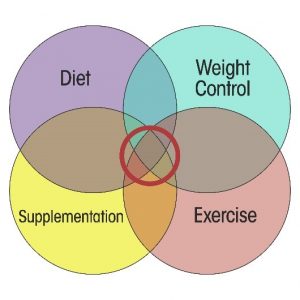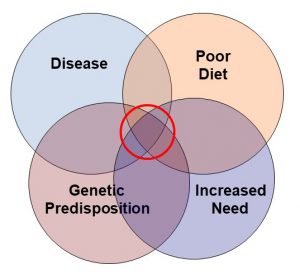A Holistic Approach To Living Healthy Longer
Author: Dr. Stephen Chaney
 Ever since Ponce de Leon’s famed 1513 expedition, people have been searching for the proverbial “Fountain of Youth”.
Ever since Ponce de Leon’s famed 1513 expedition, people have been searching for the proverbial “Fountain of Youth”.
There have been hucksters selling pills and potions to reverse the aging process. Most of them didn’t work. They were no better than snake oil.
There have been legitimate scientists investigating the effect of supplements, diets, and lifestyle on the aging process. Most of these studies have come up empty.
In this study (M Gagesch et al, Journal of Frailty And Aging, 12: 71-77, 2023) the authors hypothesized that a holistic approach might be better than individual interventions. They asked whether a combination of vitamin D3 supplementation, omega-3 supplementation, and exercise might be more effective at slowing the aging process than any one of them alone.
There was good reason for choosing each of these interventions:
- Low 25-hydroxyvitamin D levels have been associated with frailty in several studies. But association studies do not prove cause and effect, and no randomized, placebo control studies have measured the effect of vitamin D supplementation on frailty.
- Omega-3 fatty acids have been linked to skeletal muscle health, and some studies have suggested omega-3 supplementation may improve muscle function in older adults.
- A recent study has reported that a supervised exercise program reduced frailty in older adults. The authors wanted to see if the same was true for unsupervised, at-home exercise program.
How Was This Study Done?
 The data from this study were collected as part of the DO-HEALTH study, a 3-year, double-blind, randomized, placebo-controlled clinical trial designed to identify interventions that support healthy aging in European adults aged 70 and older.
The data from this study were collected as part of the DO-HEALTH study, a 3-year, double-blind, randomized, placebo-controlled clinical trial designed to identify interventions that support healthy aging in European adults aged 70 and older.
Initially, 2,157 healthy, community-dwelling adults were enrolled from five countries (Switzerland, Germany, Austria, France, and Portugal). They were examined in clinical centers at the beginning of the study and years 1, 2, and 3, with phone follow-up at 3-month intervals.
Aging was measured by something called the frailty index. At each clinic visit the participants were evaluated in five areas:
- Weakness was measured as grip strength. Weakness was defined as being in the lowest quintile of grip strength for someone their age and gender.
2) Fatigue was defined as a positive answer to the question, “In the last month have you had too little energy to do the things you wanted to do?”
3) Involuntary weight loss was defined as >5% weight loss within a year.
4) Low gait speed was defined as <2 ft/sec walking speed.
5) Low activity level was defined as a response of, “Less than once a week” to the question, “How often do you engage in activities that require a low or moderate level of energy such as gardening, cleaning the car, or going on a walk?”
-
- Participants with 0 positive items were classified as robust.
- Those with 1 or 2 positive items were classified as pre-frail.
- Those with 3 or more positive items were classified as frail.
Only those participants from the DO-HEALTH study classified as robust at the first clinical visit (1,137 participants) were included in this study. The study measured how many of them became pre-frail or frail during the average follow-up of 2.9 years.
The interventions were:
- Capsules containing a total of 2,000 IU/day of vitamin D3 with sunflower oil capsules as a placebo.
- Capsules containing a total of 1,000 mg of EPA and DHA in a 1:2 ratio with a sunflower oil capsule as a placebo.
- Exercise consisting of an unsupervised strength-training routine for 30 minutes, 3 times per week.
- In this case the control was an unsupervised joint-flexibility routine for 30 minutes, 3 times per week.
The interventions were done individually, two together (vitamin D + omega-3, vitamin D + exercise, omega-3 + exercise), and all three together (vitamin D + omega-3 + exercise).
The results were corrected for age, sex, and low-trauma falls in the preceding 12 months.
Finally, the study measured blood 25-hydroxyvitamin D levels and omega-3 levels at each office visit. They found:
- 28% of the participants were deficient in vitamin D at the beginning of the study.
- The interventions gave the expected increase in vitamin D and omega-3 status.
Can You Slow The Aging Process?
- 61.2% of the participants had declined from robust health to the pre-frail category.
- 2.6% of the participants had declined from robust health to the frail category.
[Note: The terms “pre-frail” and “frail” are measures of aging which I have described above.]
The number of participants in the frail category were too small to obtain a statistically significant measure of the effects of vitamin D, omega-3s, and exercise on frailty, so I will only discuss the results measuring their effect on pre-frailty in this review. These results are:
- None of these interventions had a statistically significant effect on aging by themselves, as measured by the transition from robust health to pre-frailty.
- None of these interventions had a statistically significant effect on aging when combined in pairs, although the vitamin D3-omega-3 pair came close to significance (31% reduction in pre-frailty with a probability of 94% (probabilities of 95% and above are considered significant.))
- However, the combination of vitamin D3, omega-3s, and exercise reduced the risk of aging by 39%, which was statistically significant (96% probability).
The authors concluded, “Robust, generally healthy and active older adults without major comorbidities [diseases], may benefit from a combination of high-dose, supplemental vitamin D3, marine omega-3s, and SHEP [unsupervised strength training] with regard to the risk of becoming pre-frail over 3 years.”
A Holistic Approach To Living Healthy Longer
 This study was a double-blind, placebo-controlled study, which is the gold standard for clinical studies. It was also unusually large (1,137 participants) and long (3 years) for this kind of study.
This study was a double-blind, placebo-controlled study, which is the gold standard for clinical studies. It was also unusually large (1,137 participants) and long (3 years) for this kind of study.
It was also much better than most double-blind, placebo-controlled studies in that it included three interventions (vitamin D3 supplementation, omega-3 supplementation, and exercise) and looked at their effect on aging individually, in pairs, and all three together.
One take-home lesson from this study was that a holistic approach that included all 3 interventions was superior to any one of these interventions alone or in pairs.
But the most important take-home lesson is this:
If you asked your doctor what you should do to slow the aging process, he or she would probably tell you, “Exercise may help, but forget supplementing with extra vitamin D or omega-3s. They have no proven benefits.”
They would be correct based on studies of each of these interventions individually. And the studies they might quote would be double-blind, placebo-controlled studies, the gold standard of clinical studies.
But would that be the best advice. Clearly not. The best advice would be to follow a holistic approach and use all 3 interventions together.
Unfortunately, this is true for most studies of supplementation. Supplements are tested individually, as if they were “magic bullets”. And most of these studies come up short. They fail to find a significant benefit of supplementation.
Supplements are almost never tested holistically in combination with each other and other interventions, but that’s where the “magic” really happens.
If you are a regular reader of “Health Tips From The Professor”, this should come as no surprise to you. I have often shared the Venn diagram on the upper left and said that the sweet spot is when two or more of these interventions overlap.
Of course, this is the first study of its kind. More studies are needed. More importantly, we need studies to fill in the other parts of the Venn diagram. We need to ask about the effect of diet and obesity on aging. For example:
- If we add a healthy diet to vitamin D, omega-3s, and exercise, can we reduce aging even more dramatically?
- Is the effort it takes to lose excess weight worth it? Does adding it to diet, supplementation, and exercise reduce the aging process even more?
Of course, I think the answer to those questions is an unequivocal, “Yes”. Multiple studies have shown that both a healthy weight and a healthy diet help you live healthier longer.
But I am a scientist. Neither diet nor weight loss have been tested in combination with supplementation and exercise. I would like to see studies combining all these modalities in a single double-blind, placebo-controlled experiment.
So, what does this mean for you? If you want to slow the aging process, if you are in search of your personal “Fountain of Youth…
- This study suggests that vitamin D3 supplementation (2,000 IU/day), omega-3 supplementation (1,000 mg of EPA + DHA), and an exercise program that emphasizes strength training can help you slow the aging process.
But that is only the beginning. I also recommend…
- Including a healthy diet and a healthy weight in your anti-aging regimen.
- Making sure your diet has enough protein and leucine, since older adults need more of both to maximize the benefits of strength training.
- Including other supplements as evidence for their benefit in slowing the aging process becomes available.
The Bottom Line
A recent double-blind, placebo-controlled study looked at the effect of vitamin D3 supplementation (2,000 IU/day), omega-3 supplementation (1,000 mg/day EPA + DHA in a 1:2 ratio), and an unsupervised strength training program on the aging process.
It differed from most other double-blind, placebo-controlled studies in that:
- It was larger (1,137 participants) and longer (3 years) than most.
- More importantly, each intervention was tested individually, in pairs, and all 3 together.
The study found that:
- None of these interventions had a statistically significant effect on aging by themselves.
- None of these interventions had a statistically significant effect on aging when combined in pairs, although the vitamin D3-omega-3 pair came close to significance.
- However, the combination of vitamin D3, omega-3s, and exercise reduced the risk of aging by a statistically significant 39%.
One take-home lesson from this study was that a holistic approach that included all 3 interventions was superior to any one of these interventions alone or in pairs.
But the most important take-home lesson is this:
If you asked your doctor what you should do to slow the aging process, he or she would probably tell you, “Exercise may help, but forget supplementing with extra vitamin D or omega-3s. They have no proven benefits.”
They would be correct based on studies of each of these interventions individually. And the studies they might quote would be double-blind, placebo-controlled studies, the gold standard of clinical studies.
But would that be the best advice? Clearly not. The best advice would be to follow a holistic approach and use all 3 interventions together.
Unfortunately, this is true for most studies of supplementation. Supplements are tested individually, as if they were “magic bullets”. And most of these studies come up short. They fail to find a significant benefit of supplementation.
Supplements are almost never tested holistically in combination with each other and other interventions, but that’s where the “magic” really happens.
For more information on this study and my recommendations on how to slow the aging process read the article above.
These statements have not been evaluated by the Food and Drug Administration. This information is not intended to diagnose, treat, cure, or prevent any disease.
___________________________________________________________________________
My posts and “Health Tips From the Professor” articles carefully avoid claims about any brand of supplement or manufacturer of supplements. However, I am often asked by representatives of supplement companies if they can share them with their customers.
My answer is, “Yes, as long as you share only the article without any additions or alterations. In particular, you should avoid adding any mention of your company or your company’s products. If you were to do that, you could be making what the FTC and FDA consider a “misleading health claim” that could result in legal action against you and the company you represent.
For more detail about FTC regulations for health claims, see this link.
https://www.ftc.gov/business-guidance/resources/health-products-compliance-guidance












































